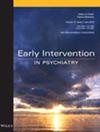An Overview of Early Psychosis Care in New Zealand—A Need for Culturally Adapted Service Models
Abstract
Background
It has been over 20 years since a review of early psychosis services in New Zealand was completed, and it is unclear if services now meet international best practice. Furthermore, significant disparities in psychosis experiences exist in New Zealand, and it is unclear whether service structure might contribute to such disparities. Given the current restructuring of the health system in New Zealand, now is the optimal time to understand strengths and weaknesses in early psychosis care provision.
Methods
All early psychosis services in New Zealand (n = 12) were surveyed. Leads from each service completed a survey on the general elements of their service, alongside the First-Episode Psychosis Services Fidelity Scale, which allows comparison with international early psychosis services.
Results
Specific services are provided across 11/20 districts, leaving 9 without any dedicated early psychosis care. Service strengths included short wait lists, comprehensive assessments, good provision of case managers, team managers and psychiatrists and good length of care. Relative weaknesses included provision of therapy, limited age ranges, high numbers of inpatient referrals, poor Clozapine usage and limited family participation. There was also a lack of services for people at risk for psychosis. Lack of cultural support staff, models and confidence in meeting cultural needs was also evident.
Conclusion
While New Zealand early psychosis services are relatively comparable to international services, certain areas of weakness need to be addressed by decreasing variability in service eligibility, increasing care for those at-risk, wider availability of therapy and family involvement and improved cultural services.


 求助内容:
求助内容: 应助结果提醒方式:
应助结果提醒方式:


